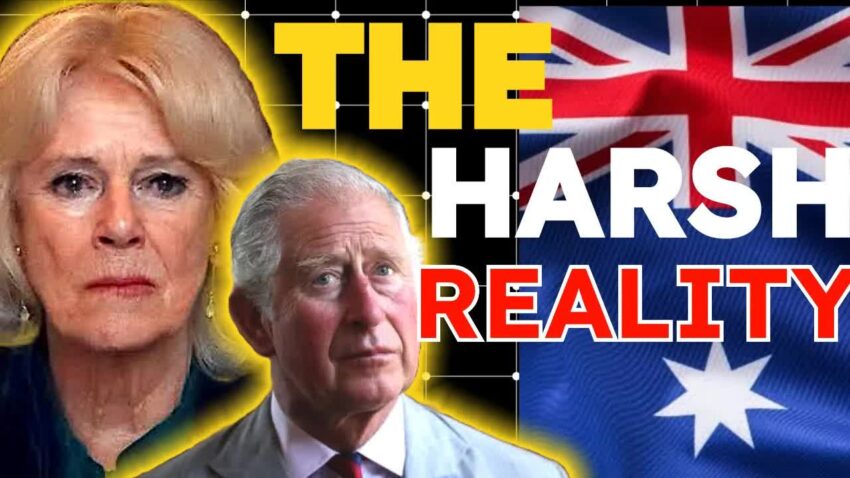As the countdown begins for King Charles and Camilla’s visit to Australia, the mood among the public is anything but festive.
Instead of excitement, there’s a palpable sense of skepticism and criticism brewing.
This royal engagement, meant to strengthen ties between the monarchy and the Commonwealth, is overshadowed by a growing discontent that has simmered for years.
Many Australians are beginning to see the royal family as a relic of the past, with anti-monarchist sentiments gaining momentum.
With the announcement of their visit, discussions about potential protests and demonstrations are already making waves.
It seems that the royal couple might have a challenging reception ahead of them.
One prominent voice of dissent is Craig Foster, a former Australian football captain and noted human rights advocate.
Foster made headlines recently by declining an invitation to meet King Charles, a move that has resonated widely across social media and sparked conversations about Australia’s future as a nation.
Foster’s refusal to engage with the monarch isn’t just a personal decision; it symbolizes a broader desire among many Australians for the country to establish its own head of state.
The sentiment reflects a growing frustration with a monarchy that many feel is increasingly irrelevant.
As the royals prepare for their trip, the media is buzzing with speculation about King Charles’ health, particularly reports suggesting he may need to pause his cancer treatment for royal duties.
This raises ethical questions that are hard to ignore.
Should the monarchy prioritize royal obligations over personal health?
Many citizens are questioning the wisdom of such choices, and the narrative surrounding the King’s health will likely dominate discussions leading up to the visit.
Critics argue that this scenario highlights a misplaced sense of duty, where the crown’s expectations seem to overshadow individual well-being.
Moreover, the financial implications of the visit are stirring up further discontent.
Australians are voicing concerns about taxpayer money being used to fund royal engagements, especially during times when local issues like healthcare and education desperately need attention.
There’s a growing call for accountability from the monarchy, with people demanding transparency regarding the use of public funds.
Amidst all this, skepticism about the royal family’s health disclosures is also on the rise.
Questions are swirling about the authenticity of claims regarding their medical conditions, and many are doubtful about the transparency of the monarchy.
Past mixed messages from the royal family have left Australians wondering if they can trust the information being shared, which could further alienate the royals from the very public they aim to connect with.
As the visit approaches, public reactions are already taking shape, with social media buzzing with memes and satirical content mocking the royal couple.
This shift in perception indicates a growing disconnect between the monarchy and the Australian populace.
Royal visits, once treated with reverence, are now subjects of scrutiny and ridicule.
The question of Australia’s future as a constitutional monarchy is likely to resurface during the visit.
The debate over whether Australia should transition to a republic remains a hot topic, with many feeling that it’s time for the nation to assert its independence from the British monarchy.
Advocates for a republic may seize this opportunity to voice their opinions, pushing for significant change.
While the royal couple’s itinerary includes ceremonial events and public engagements, the underlying tension may overshadow any planned festivities.
Some Australians may welcome the royals with open arms, but others are likely to organize protests, expressing their dissatisfaction with the monarchy.
This contrasting response highlights the complex relationship between the monarchy and the Australian public, where admiration and criticism coexist.
King Charles and Camilla’s upcoming visit is set to become a pivotal moment for discussions about the monarchy’s role in modern society.
The backlash isn’t just aimed at the individuals involved, but rather reflects deeper societal sentiments about governance and representation.
With figures like Craig Foster leading the charge, the scrutiny surrounding royal health decisions and financial concerns point to a monarchy struggling to maintain relevance.
As the royal couple gears up for their visit, it’s clear that they cannot rely solely on tradition to win over the Australian people.
A genuine connection with contemporary values and priorities is essential for their acceptance.
This visit serves as a reminder that the monarchy must adapt to the evolving expectations of its constituents.
Without a sincere effort to engage with the public, King Charles and Camilla risk becoming increasingly sidelined in the hearts and minds of Australians.
The outcome of their visit could have significant repercussions for the monarchy’s standing in Australia.
It may influence public sentiment and potentially shape the future of the nation’s relationship with the royal family.
As the royals navigate this complex landscape, their ability to resonate with the Australian public will be crucial in determining their legacy in the country.
